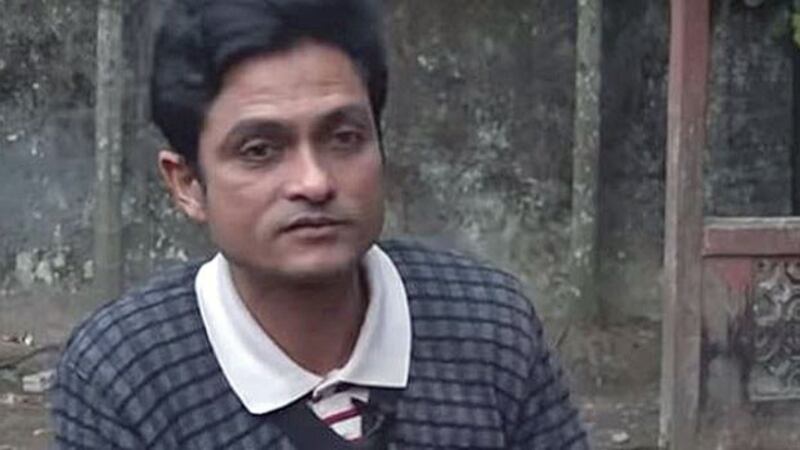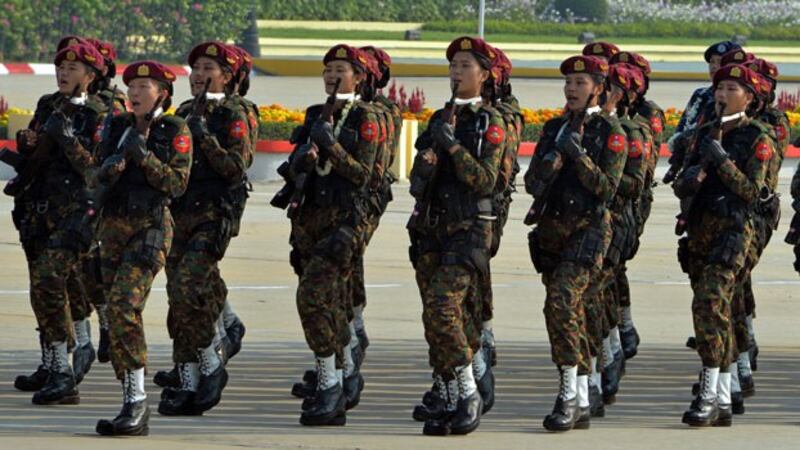The more than 600 Rohingya refugees who have returned to Myanmar from Bangladesh of their own volition say they have not yet been able to go back to their original villages and are facing hardship in violence-ridden northern Rakhine state nearly three years after their expulsion by army troops.
Thousands of members of the Muslim minority group were killed during a brutal military-led crackdown on their communities in 2017, while more than 740,000 others escaped across the border, where they now live in sprawling displacement camps in southeastern Bangladesh.
Despite an agreement between Myanmar and Bangladesh to repatriate Rohingya refugees who receive approval to return, none of the displaced Rohingya has shown up at border crossings to go back to northern Rakhine state through the official program, citing fears of ongoing discriminatory policies and more violence.
A refugee named Chowbi told RFA's Myanmar Service that he returned to northern Rakhine on his own in September 2019 via the Taungbyo border crossing.
The 35-year-old fled Oodaung village during the August 2017 violence, which included indiscriminate killings, mass rapes, and community torchings, and lived for two and a half years in the Thankhali refugee camp in Bangladesh.
Upon his return to Oodaung, Chowbi found the village deserted.
Because he cannot afford to rent a home in town, he is now organizing other Rohingya villagers to resettle in their original community.
“I really miss my former life whenever I visit Oodaung village,” he told RFA’s Myanmar Service. “There is no home in the village now. I still want to return to the village.”
If he can convince five to 10 households to return to the village, they all will resettle in Oodaung, he said
“For now, we are renting a place, [and] the cost is high, so we are facing hardships since we came back here,” Chowbi said.
More than 500,000 Rohingya fled to Bangladesh from Muslim-majority Maungdaw district, comprising Maungdaw and Buthidaung townships, to escape the crackdown. So far, 624 refugees have been accepted back, according to district administrative office.
Maungdaw district administrator Soe Aung said the refugees who have returned were not among those approved for repatriation under an agreement between Myanmar and Bangladesh, but rather voluntary returnees who contacted the district’s administrative office to arrange to come back on their own.
Nearly 250 Rohingya rescued by the Myanmar Navy while traveling by boat from Bangladesh to Malaysia are included in the list of more than 600 returnees.
The government said it has provided food and other assistance to the returnees, many of whom now live with their relatives while others rent homes in town because they don’t believe it is safe enough yet to return to their villages of origin.

‘Almost out of money’
Mahmad Shawri, another returned Rohingya refugee, said he fled to Bangladesh during the campaign of violence and stayed in a camp for more than a year. He returned to Myanmar on his own a year ago after contacting Myanmar authorities.
He said he previously lived in Meetike village tract in Taungpyo township but now rents a house in Maungdaw town and struggles to afford the 100,000-kyat (U.S. $67) monthly rent.
“I cannot afford it,” he said. “I’ve been paying the rent by selling my wife’s jewelry. Now we are almost out of money.”
Because the Rohingya are considered illegal immigrants from Bangladesh, they face routine discrimination in Myanmar which limits their movements, denies them access to jobs, health care, and education, and forbids them from becoming citizens.
Mahmad Shawri said he wanted to return to his former village but that it is not safe for his family to live there as the only household in the deserted settlement.
Many Rohingya refugees who have returned from Bangladesh said there are many others like them who want to go back to northern Rakhine, but that they face obstacles such as unhelpful Bangladeshi authorities and continuing threats from armed groups like the Arakan Rohingya Salvation Army (ARSA), a Muslim militant group whose deadly attacks on police outposts triggered the 2017 crackdown.
Nuru Mohamad, another Rohingya refugee, said he returned to Maungdaw district with his family, though his daughter and son-in-law remained behind in a Bangladesh displacement camp. Now they want to return to northern Rakhine as well.
“My daughter is concerned about us a lot,” he said. “She is looking into all means to return to Myanmar and unite with her parents.”
“She said she might cross the border illegally to return to Myanmar, [but] I told them not to return illegally and instead to return through the official repatriation camps,” he added.
Nuru Mohamad lived in Zinpaingnya village tract in northern Maungdaw district but now resides in Maungdaw town because his village remains deserted.
Mahmad Hasaung, the administrator of Padin village tract in southern Maungdaw, said he has requested that local officials build homes for seven families who have returned.
“We’ve got seven families who have returned from a repatriation camp,” he said. “We are not returning to our original village.”
“The government said that houses would be built for these families,” he added. “We have given them a list. We’ve got the plan to build homes, but so far, none have been built.”
Rakhine authorities have set up a reception center in Nga Khu Ya village and a transit camp in Hla Phoe Khaung village for Rohingya refugees who return from Bangladesh.
Maungdaw district administrator Soe Aung said authorities will let those who have come back continue to live in the transit camp if they have no other place to go.
“We are honoring the wishes of the returnees,” he told RFA. “If they have no place to stay and cannot afford to pay rent, then we will settle them in Hla Phoe Khaung.”
“But they also don’t want to stay in Hla Phoe Khaung,” he added. “They will be settled only after houses have been built for them.”
“They said they don’t want to stay, so we resettled them as they wished,” Soe Maung said.

Attack in Rohingya village
The struggle to resettle returning Rohingya refugees in parts of northern Rakhine comes amid ongoing military violence in the state.
Myanmar’s armed forces on Monday accused the rebel Arakan Army (AA), which operates in the region, of trying to frame servicemen for an attack on Rohingya civilians as Myanmar faces genocide charges at the U.N.’s top court for atrocities allegedly committed during the 2017 army-led crackdown.
Spokesman Brigadier General Zaw Min Tun told a press conference in Naypyidaw that the AA is responsible for the deaths of two civilians in a village in Buthidaung township on Jan. 31 and that soldiers beat and raped Rohingya women — an accusation that the Arakan force rejected.
“In Buthidaung’s Kintaung village, two villagers were killed and seven were injured by the blasts of shelling by AA insurgents,” he said. “We are going to elaborate upon that incident with comprehensive evidence.”
Four AA rebels who arrived in Theintan village on the evening of Jan. 31 beat, raped, and committed other sexual assaults on some Rohingya women in the village, he said.
Afterwards, the AA soldiers left the village, and a group of about 30 Arakan fighters returned later that evening.
“They besieged the village, saying that they would burn the houses to the ground,” Zaw Min Tun said in his account of the event, adding that the villagers sent a letter requesting help from the closest Myanmar military regiment.
AA spokesman Khine Thukha denied the accusation, calling it a lie.
“The news that AA soldiers had raped Bengali women in Buthidaung township is a total fabrication,” he told RFA, using a derogatory name for the Rohingya. “There was no such case.”
In his version of the event, a Rohingya motorbike driver transporting two young ethnic Rakhine men did not stop at their desired location, but instead took them to the village whose residents emerged from their homes and attacked them.
Only when a nearby Rakhine man shouted at them to stop did the villagers stop their assault and leave, Khine Thukha said.
“We have learned that they fabricated it as a rape story to cover up their attack on the Rakhine men,” he said.
“We have noticed these days that the military is deploying many tactics to provoke racial tension between [ethnic] Rakhine people and Muslims,” he added.
“We found that the military is using Muslims to instigate riots,” he said.
ICJ order
The village attack comes on the heels of a decision by the International Court of Justice (ICJ) in The Hague to impose provisional measures on Myanmar to ensure the safety of Rohingya still living inside the country and to preserve evidence of rights abuses during the 2017 crackdown that left several thousands dead and forced more than 740,000 other to flee to Bangladesh.
The court is handling a larger case against Myanmar filed by Gambia in November on behalf of the Organization of Islamic Cooperation for violating the Genocide Convention during the alleged expulsion of Rohingya to Bangladesh amid the violence.
“On the 23rd of January, the ICJ’s provisional measures order came out,” Zaw Min Tun said. “This incident happened two days later.”
“This was a planned attack to distort the reputation of the government, the military, and other security forces in the eyes of the international community and ICJ observers,” he said.
Days before the ICJ’s order, a Myanmar-appointed Independent Commission of Enquiry (ICOE) that probed military operations during the crackdown said in its final report that war crimes and serious human rights violations had occurred in Rakhine but did not have “genocidal intent.”
The week that the ICJ’s order and the ICOE’s report were issued saw a flare-up in armed conflict between Myanmar soldiers and the AA, which is fighting for greater autonomy in Rakhine state, in Rohingya-majority Maungdaw and Buthdaung townships.
“When the ICOE issued a report last November, we made an announcement that we would pursue legal procedures in investigating and finding evidence,” Zaw Min Tun said. “We will stay put on that announcement.”
In November, the ICOE sent a letter to military commander-in-chief Senior General Min Aung Hlaing, briefing him on relevant findings by the commission for further investigation through a court of inquiry or a court martial.
“We regard to ICJ orders, we will act according to the existing laws,” he added.
Reported by Min Thein Aung, Thiha Tun, and Thet Su Aung for RFA’s Myanmar Service. Translated by Ye Kaung Myint Maung. Written in English by Roseanne Gerin.
